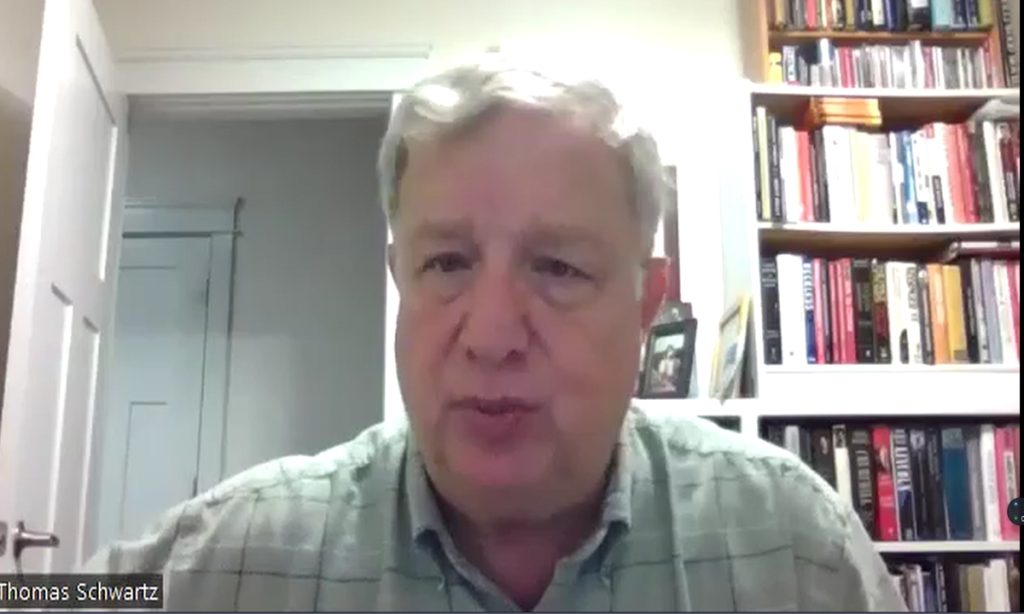Kissinger's great goal was to create a structure of peace and stability: biographer

The best way to commemorate Henry Kissinger may well be to remember the importance of diplomacy and the need for great powers to behave responsibly and soberly in their relations with each other, Thomas A. Schwartz, a renowned academician and author of Henry Kissinger and American Power: A Political Biography, told the Global Times on Thursday.
As the biography author who spent long time with Kissinger for the book, Schwartz noted that Kissinger's great goal was to "create a structure of peace and stability, and we would honor him by pursuing that effort."
Former US secretary of state Henry Kissinger died on Wednesday at his home in Connecticut at the age of 100, Kissinger Associates Inc said in a statement.
He is viewed as an important figure in the China-US icebreaking process in 1972 while his secret trip to China in 1971 paved the way for a thawing of bilateral relations, which ushered in a new era in China-US relations and for the world.
Kissinger was an "intermediary" between China and the US government. He carried messages to Chinese leaders from the US and carried responses back to American presidents. He played a leading role in US foreign policy during the Nixon and Ford presidencies, and his diplomatic ideas continued to have a profound impact on the US government's foreign policy even after he left office.
According to records, since then Kissinger has visited China more than 100 times in his lifetime with his last visit having been made in July 2023 when bilateral ties hit a low point.
"We need more figures, who are in that realm of communicating between the two countries. And we need to have a whole range of institutional dialogues between government, military, and economic officials, so that there is a constant understanding," Schwartz told the Global Times previously.
Schwartz also said that, although Kissinger was 100, he was still surprised when he heard the news of his death.
"Two days ago I watched an interview he did, and he was still sharp and articulate, and his analysis of international issues remained impressive. He seemed indestructible," he said.
Kissinger was known for his longevity as he kept maintained a grueling 15-hour workday and demanding international travel schedule even at the age of 99, according to media reports. On China's social media platforms, some netizens discussed heatedly about his habit of staying up late and eating fried food but can still keep healthy and energetic.
In response to the question about what lessons current and future world leaders should draw from Kissinger's experiences and diplomatic strategies, he underscored negotiation in which Kissinger had strong faith.
"Kissinger firmly believed in negotiation, and he believed in sticking with negotiations even in the most difficult circumstances. He believed that diplomacy was better than hostility, and that nations with different systems could coexist and live together peacefully," he said. "This sounds simplistic, but it really was something he constantly advocated and sought to achieve."
In a previous interview with the Global Times, Schwartz said that a major difference between Kissinger and diplomats in the US today is that, presently "a lot of our diplomats have relatively little sense of the broader range of history. Kissinger had a sense from history that terrible things can happen. And I think American diplomats today sometimes don't recognize the degree of danger that can come from careless diplomacy."
In this sense, Kissinger always had a sense that people needed to be extraordinarily careful in undertaking diplomatic tests, and that people should not treat disputes between nations lightly.
"There is a tendency to think of short-term advantages instead of long-term interests. I think Kissinger had a broader and a longer term sense, partly because he was thinking as a historian, or as someone who has a vision of a longer period, he pointed out," he said.
According to Schwartz, Kissinger hoped that Americans will have a broader historical vision of world stability and a broader understanding of other countries. "I think he would like that to be his legacy: A better understanding of the world and of other countries, and of the need for effective diplomacy to maintain peace."